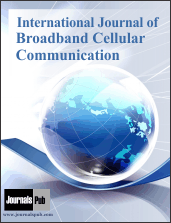Editor Overview
IJBCC maintains an Editorial Board of practicing researchers from around the world, to ensure manuscripts are handled by editors who are experts in the field of study.
Publisher
JournalsPubAn Imprint of Dhruv Infosystems Pvt Ltd
A-118, 1st Floor, Sector-63, Noida, U.P. India,Pin-201301
E-mail: [email protected]
(Tel):
(Mob) (+91) 9810078958, +919667725932
Focus and Scope

About the Journal
International Journal of Broadband Cellular Communication primary goal of this journal is to facilitate the scientific communication between academicians and industries and to make sufficient contribution towards ever changing technology. Journals published original, high quality papers that are peer-reviewed by our expert editorial team to ensure only good quality papers are published.
All contributions to the journal are rigorously refereed and are selected on the basis of quality and originality of the work. The journal publishes the most significant new research papers or any other original contribution in the form of reviews and reports on new concepts in all areas pertaining to its scope and research being done in the world, thus ensuring its scientific priority and significance.
Focus and Scope
Base Station Management: Heterogeneous network, Association mechanism,Energy efficiency,Device-to-Device communications,SBS management mechanism, mobile radio, optimisation, HeNB (Home e-Node Base), GNSS augmentation.
Wideband CDMA: Frequency Division Duplex, Time Division Duplex, Phone technology, Wireless communication systems, Frequency bands, Data rate transmission, Bandwidth, Direct Sequence Spread Spectrum (DSSS), Power Spectral Density (PSD).
Direct Sequence CDMA: Code Sequence, Chip Sequence, Spread-Spectrum Modulation, Signal, Transmitter, BPSK Demodulator, Orthogonal Codes, Hybrid acquisition and Sequential Detection.
Multicode CDMA: High-speed data communications, Multicode interference, RAKE Receiver, Complex spreading, Interference cancellation, Code division multiple access,Digital radio,Packet radio networks and Wireless Networks.
Channel Capacity: communication channel, noisy-channel coding theorem, error correction coding, Shannon capacity, additive white Gaussian noise (AWGN),Bandlimited AWGN channel, Frequency-selective AWGN channel, Slow-fading channel, Fast-fading channel.
Multi-User MIMO Systems: Uplink, Downlink, Dirty Paper Coding, MAC, BC, Channel Sate Information at the Receiver, CSIR
Multi-hop NetworksWireless sensor networks, Wireless mesh networks, Mobile ad hoc networks, Smart phone ad hoc networks, Mobile networks with stationary multi-hop relays, broadcast network, transceiver,
Multiple-input and multiple-output Relay Channel: optimal relay amplifying matrix,channel state information,two-stage training algorithm, channel estimation algorithm, Proposed channel estimation algorithm, Trilinear alternating LS,Channel estimation.
MIMO Antenna Design: MIMO UWB antenna, Isolation, Mutual coupling, ECC (envelope correlation coefficients),transmitter,receiver, single radio channel, digital-signal processing,vector signal generators, vector signal analyzers.
MIMO Prototyping:Testbed design, Prototyping, ASIP, Processor, Internet of Things (IoT), Single Antenna Mobile Station, Multi-Antenna Mobile Station
Call establishment procedure: Session Initiation Protocol (SIP),Voice over Internet Protocol (VoIP), Multipurpose Internet Mail Extensions (MIME), Session Description Protocol (SDP),Public Key Infrastructure, Domain Name System (DNS),reverse control Channel.
Call clearing procedures: common-channel signaling, automated information system (AIS), storage devices , Disengagement originator.
Open Access Statement
IJBCC is an open-access (OA) publication which provides immediate open access to its content on the principle that making research freely available to the public supports a greater global exchange of knowledge. All published works will be available to a worldwide audience, free, immediately upon publication. Publication in the journal is subject to payment of an article processing charge (APC). The APC serves to support the journal and ensures that articles are freely accessible online in perpetuity under a Creative Commons licenses.
Publication Ethics Statement
IJBCC fully adhere to Code of Conduct of Publication Ethics (COPE) and to its Best Practice Guidelines. The Editorial Team enforces a rigorous peer-review process with strict ethical policies and standards to ensure the addition of high-quality scientific studies to the field of scholarly publication. In cases where ctit becomes aware of ethical issues, it is committed to investigating and taking necessary actions to maintain the integrity of the literature and ensure the safety of research participants. Click here to read more about the Research & Publication virtue ethics
Content Disclaimer
All IJBCC the information’s, opinions, and views mentioned here represents the authors and the contributions of the articles. Publication of articles, advertisements, or product information does not constitute endorsement or approval by the journal. cannot be help responsible for any error or consequences while using the information updated in this journal. Although every effort is done by ctit to see that there’s no any inaccurate data, misleading data, opinion or statement within the journal, the data and opinions appearing in the articles are the responsibility of the contributors concerned.



